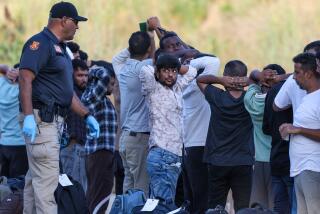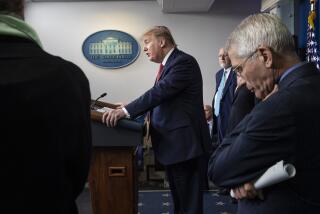Rep. Peter King defends Muslim ‘radicalization’ hearing
In opening his congressional hearing on the “radicalization” of Muslims in the United States, Rep. Peter King on Thursday forcefully pushed back against critics who contend his inquiry demonizes an entire community and threatens national security.
“I remain convinced that these hearings must go forward. And they will,” King told a packed hearing room on Capitol Hill. “To back down would be a craven surrender to political correctness and an abdication of what I believe to be the main responsibility of this committee -- to protect America from a terrorist attack.
“Despite what passes for conventional wisdom in certain circles, there is nothing radical or un-American in holding these hearings,” said King, who chairs the House Homeland Security Committee.
King, a Republican congressman from New York whose district was heavily affected by the Sept. 11, 2001, attacks, convened the hearing because of what he termed a growing threat of homegrown terrorism among Muslim men in the United States.
“Today, we must be fully aware that homegrown radicalization is part of Al Qaeda’s strategy to continue attacking the United States,” King said. “Al Qaeda is actively targeting the American Muslim community for recruitment. Today’s hearing will address this dangerous trend.”
King cited the plots to bomb Times Square and the subways in New York, as well as the shootings in 2009 at Ft. Hood, Texas, among others, as examples.
Democrats, civil-rights groups and some terrorism experts have criticized the hearings, saying they could stigmatize Muslim Americans and increase hostility worldwide between Muslims and the U.S. government.
Rep. Keith Ellison (D-Minn.), a Muslim, offered emotional and sometimes tearful testimony in objecting to King’s efforts.
“This committee’s approach to this particular subject is contrary to the best of American values and threatens our security,” Ellison said, saying that King was assigning “collective blame to a whole group” and was “stereotyping and scapegoating.”
His voice broke as he described the actions of Mohammed Salman Hamdani, a paramedic from New York, who died while responding to the 9/11 attacks.
Rep. Bennie Thompson (D-Miss.), the ranking member of committee, warned that the hearings could increase “fear and mistrust” in the Muslim American community.
“An obligation to be responsible does not equal political correctness,” Thompson said.
“In scores of hearings and briefings, members of this committee have been told that Al Qaeda’s main recruiting tool is the notion that the powers of the West are aligned against the people of the Middle East,” Thompson said. “We cannot give this lie a place to rest. I cannot help but wonder how propaganda about this hearing’s focus on the American Muslim community will be used by those who seek to inspire a new generation of suicide bombers.”
But King received qualified support from veteran Rep. John Dingell (D-Mich.), whose district has a significant population of Muslim Americans. Dingell said the hearing had “great potential” and could produce “good results.”
Calling the majority of Muslims in the country “loyal, decent and honorable Americans,” Dingell raised the specter of the infamous Sen. Joseph McCarthy of Wisconsin, who chaired the anti-Communism hearings of the 1940s and 1950s. Dingell called on King to conduct the hearings in a “fair, honorable and thoughtful fashion.”
Los Angeles County Sheriff Lee Baca, invited by Democrats to appear at King’s hearing, stressed the need for building trust between the police and Muslim Americans and other communities in regions such as Southern California. He was the only member of the law enforcement community scheduled to testify.
“The concept of public trust is the core message of my testimony,” Baca said. “Policing requires extraordinary ability to interact with people, particularly in a diverse society.”
“America is becoming a society of the world,” he said.
Baca warned against a “a false assumption that any particular region or group are more prone to radicalization than others,” noting a high number of terror-related plots that did not involve Muslims. He also noted that Muslim Americans had helped foil “seven of the last 10” plots launched by Al Qaeda in the United States.
Baca testified alongside Melvin Bledsoe and Abdirizak Bihi, parents of sons they said were converted to violent and radical Islam. Beldsoe’s son, Carlos, now known as Abdulhakim Mujahid Muhammad, killed one Army private and wounded another in an attack on a military recruiting center in Little Rock, Ark., in 2009.
Bledsoe said Americans are “in denial” about the threat of homegrown Islamic terrorism.
“Americans are sitting around doing nothing about radical extremists,” Bledsoe said. “This is a big elephant in the room. Our society continues not to see it.”
During the course of the hearing, Democrats continued to accused King of profiling and stereotyping Muslim Americans.
“This is an outrage,” shouted Rep. Sheila Jackson-Lee of Texas, as King banged the gavel and told her that her time to speak had expired.
Rep. Laura Richardson of Long Beach compared King to McCarthy, saying that “the narrow scope of this hearing is discriminatory and an abuse of power,” she said.
Republicans on the panel singled out the Council on America-Islamic Relations, a Washington advocacy group, as contributing to a culture in America in which imams and mosques are encouraged to be uncooperative with law enforcement.
“I have said that there are too many mosques that do not cooperate with law enforcement, and I think the testimony today has backed that up,” King said.
Baca said he knew of no allegations in Los Angeles that CAIR encouraged Muslims to not cooperate with his deputies.
“I have not experienced anything that suggests that CAIR supports terrorism in Southern California,” he said.
Baca told that panel that because of his department’s outreach efforts to the Muslim American community, “We can go into mosques in Los Angeles, and we do that frequently.”
“Muslims are just as independent, just as feisty, just as concerned about their safety,” he added. “They certainly don’t want their homes or mosques blown up.”
james.oliphant@latimes.com
More to Read
Sign up for Essential California
The most important California stories and recommendations in your inbox every morning.
You may occasionally receive promotional content from the Los Angeles Times.










